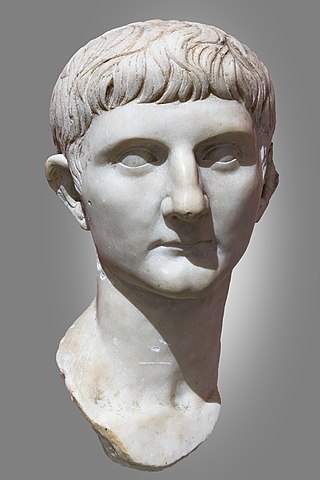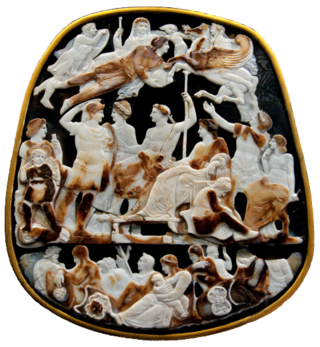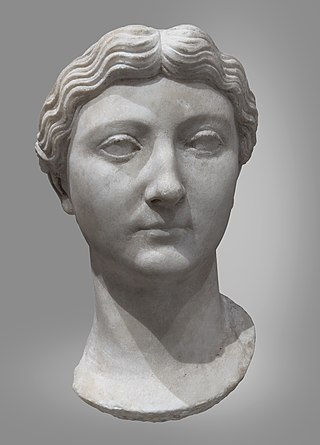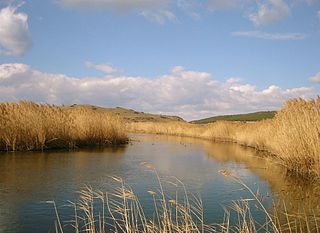
Agrippina "the Elder" was a prominent member of the Julio-Claudian dynasty. She was the daughter of Marcus Vipsanius Agrippa and Augustus' daughter, Julia the Elder. Her brothers Lucius and Gaius Caesar were the adoptive sons of Augustus, and were his heirs until their deaths in AD 2 and 4, respectively. Following their deaths, her second cousin Germanicus was made the adoptive son of Tiberius, Augustus' stepson, as part of Augustus' succession scheme in the adoptions of AD 4. As a result of the adoption, Agrippina was wed to Germanicus in order to bring him closer to the Julian family.

Julia Agrippina, also referred to as Agrippina the Younger, was Roman empress from 49 to 54 AD, the fourth wife and niece of Emperor Claudius, and the mother of Nero.

Tiberius Claudius Caesar Augustus Germanicus was the fourth Roman emperor, ruling from AD 41 to 54. A member of the Julio-Claudian dynasty, Claudius was born to Drusus and Antonia Minor at Lugdunum in Roman Gaul, where his father was stationed as a military legate. He was the first Roman emperor to be born outside Italy. Nonetheless, Claudius was an Italian of Sabine origins.

Caligula, formally known as Gaius, was the third Roman emperor, ruling from AD 37 until his assassination in AD 41. He was the son of the Roman general Germanicus and Agrippina the Elder, Augustus' granddaughter. Caligula was born into the first ruling family of the Roman Empire, conventionally known as the Julio-Claudian dynasty.

Germanicus Julius Caesar was an ancient Roman general and politician most famously known for his campaigns in Germania. The son of Nero Claudius Drusus and Antonia the Younger, Germanicus was born into an influential branch of the patrician gens Claudia. The agnomen Germanicus was added to his full name in 9 BC when it was posthumously awarded to his father in honor of his victories in Germania. In AD 4 he was adopted by his paternal uncle Tiberius, who succeeded Augustus as Roman emperor a decade later. As a result, Germanicus became an official member of the gens Julia, another prominent family, to which he was related on his mother's side. His connection to the Julii Caesares was further consolidated through a marriage between himself and Agrippina the Elder, a granddaughter of Augustus. He was also the father of Caligula, the maternal grandfather of Nero, and the older brother of Claudius.

The Julio-Claudian dynasty comprised the first five Roman emperors: Augustus, Tiberius, Caligula, Claudius, and Nero.

Tiberius Julius Caesar Augustus was the second Roman emperor. He reigned from AD 14 until 37, succeeding his stepfather, the first Roman emperor Augustus. Tiberius was born in Rome in 42 BC. His father was the politician Tiberius Claudius Nero and his mother was Livia Drusilla, who would eventually divorce his father, and marry the future-emperor Augustus in 38 BC. Following the untimely deaths of Augustus' two grandsons and adopted heirs, Gaius and Lucius Caesar, Tiberius was designated Augustus' successor. Prior to this, Tiberius had proved himself an able diplomat, and one of the most successful Roman generals: his conquests of Pannonia, Dalmatia, Raetia, and (temporarily) parts of Germania laid the foundations for the empire's northern frontier.

The 30s decade ran from January 1, AD 30, to December 31, AD 39.

Livia Drusilla was Roman empress from 27 BC to AD 14 as the wife of Emperor Caesar Augustus. She was known as Julia Augusta after her formal adoption into the Julian family in AD 14.

Lucius Aelius Sejanus, commonly known as Sejanus, was a Roman soldier, friend and confidant of the Roman Emperor Tiberius. Of the Equites class by birth, Sejanus rose to power as prefect of the Praetorian Guard, of which he was commander from AD 14 until his execution for treason in AD 31.

The gens Claudia, sometimes written Clodia, was one of the most prominent patrician houses at ancient Rome. The gens traced its origin to the earliest days of the Roman Republic. The first of the Claudii to obtain the consulship was Appius Claudius Sabinus Regillensis, in 495 BC, and from that time its members frequently held the highest offices of the state, both under the Republic and in imperial times.

Nero Julius Caesar was the adopted grandson and heir of the Roman Emperor Tiberius, alongside his brother Drusus. Born into the prominent Julio-Claudian dynasty, Nero was the son of Tiberius' general and heir, Germanicus. After the deaths of his father and of Tiberius' son, Drusus the Younger, Nero and his brother Drusus were adopted together by Tiberius in September AD 23. As a result of being heirs of the emperor, he and his brother enjoyed accelerated political careers.

Julia Livilla was the youngest child of Germanicus and Agrippina the Elder and the youngest sister of the Emperor Caligula.
Thrasyllus of Mendes, also known as Thrasyllus of Alexandria and by his Roman name Tiberius Claudius Thrasyllus, was an Egyptian grammarian and literary commentator. Thrasyllus was an astrologer and a personal friend of the Roman emperor Tiberius, as mentioned in the Annals by Tacitus and The Twelve Caesars by Suetonius.

Myrina was one of the Aeolian cities on the western coast of Mysia, about 40 stadia to the southwest of Gryneion. The former bishopric is now a Latin Catholic titular see.

Tiberius Julius Mithridates Philogermanicus Philopatris, also known as Mithridates III of the Bosporus, was a Roman client king of the Bosporus.

The ancient Olympic Games were a series of athletic competitions among representatives of city-states and were one of the Panhellenic Games of Ancient Greece. They were held in honor of Zeus, and the Greeks gave them a mythological origin. The originating Olympic Games are traditionally dated to 776 BC. The games were held every four years, or Olympiad, which became a unit of time in historical chronologies. They continued to be celebrated when Greece came under Roman rule in the 2nd century BC. Their last recorded celebration was in AD 393, under the emperor Theodosius I, but archeological evidence indicates that some games were still held after this date. The games likely came to an end under Theodosius II, possibly in connection with a fire that burned down the temple of the Olympian Zeus during his reign.
Iccus of Taranto was a Magna Grecia Olympic athlete, a victor during the 84th Games (444 BC) or 70th Games according to older sources. He is considered the father of athletic dietology. He prepared himself physically before competing according to ethical-religious Pythagorean concepts by abstaining from sexual intercourse and a frugal diet specially prepared. He also taught these principles. Pausanias calls him the best gymnast of his age, and Plato also mentions him with great praise.
Patrobius was a prominent freedman in the time of ancient Roman Emperor Nero. He and Helius exercised great and pernicious power and influence under Nero. In 66 AD he put on a luxurious show at Puteoli to honor the Armenian king Tiridates. Patrobius was executed along with several other of Nero's favorites after Galba came to power. They were marched in chains around the city before they were publicly executed.















